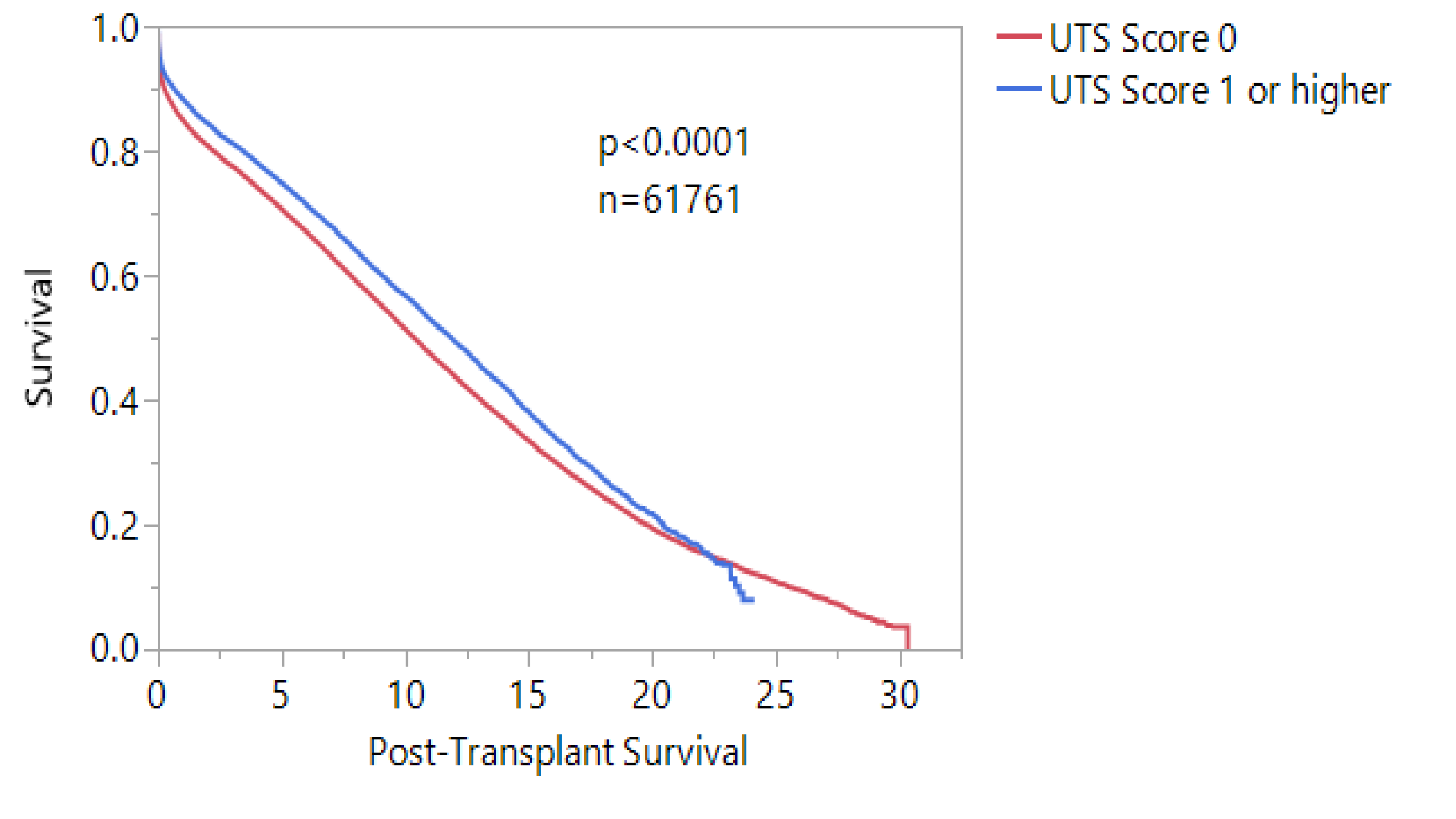What Are You Smoking? The Impact of Donor Drug Use on Long Term Survival Post-Transplant
D. A. Baran1, A. Long1, J. T. Lansinger2, H. Copeland3, J. M. Herre1, W. Old1, G. Zeevi1, C. Barreiro1, C. Kemp1, B. H. Smith1, K. Stelling1, A. Ingemi1, P. Bourassa1, J. Philpott1
1Sentara Heart Hospital, Norfolk, VA, 2Eastern Virginia Medical School, Norfolk, VA, 3Division of Cardiothoracic Surgery, University of Mississippi Medical Center, Jackson, MS
Meeting: 2019 American Transplant Congress
Abstract number: 296
Keywords: Donors, unrelated, Heart, Heart/lung transplantation, Survival
Session Information
Session Name: Concurrent Session: Donor and Recipient Selection in Heart Transplanation
Session Type: Concurrent Session
Date: Monday, June 3, 2019
Session Time: 2:30pm-4:00pm
 Presentation Time: 2:42pm-2:54pm
Presentation Time: 2:42pm-2:54pm
Location: Room 206
*Purpose: Drug use is a common aspect in the history of heart transplant donors. Whether prior or current drug use is associated with inferior post transplant outcomes is controversial. Previous work has examined UNOS data which did not specify the toxicology data at the time of hospital admission.
*Methods: The UNOS heart transplant data file was obtained including the type in toxicology field which began in 2007. Using a custom database program, each toxicology record was manually reviewed and adjudicated for 21 drugs and a Measured Tox Score (MTS) created with one point for each drug. Drugs were: acetaminophen, amphetamine, barbiturate, benzodiazepines, buprenorphine, cocaine, ethanol, ethylene glycol, isopropanol, lithium, marijuana, MDMA, methadone, methamphetamine, methanol, opiates, phencyclidine, propoxyphene, salicylates, synthetic opiates, and tricyclic antidepressants. A UNOS Tox score (UTS) was also created from the 9 drug use binary variables collected by UNOS. These variables were “ALCOHOL_HEAVY_DONOR, CONTIN_ALCOHOL_OLD_DON, CONTIN_COCAINE_DON, CONTIN_IV_DRUG_OLD_DON, CONTIN_OTH_DRUG_DON, HIST_ALCOHOL_OLD_DON, HIST_COCAINE_DON, HIST_IV_DRUG_OLD_DON, HIST_OTH_DRUG_DON”. Survivals for heart transplant recipients was compared based on toxicology results and compared with log-rank statistics.
*Results: The UNOS dataset consisted of records on 61819 heart transplants recorded up until March 2018. The UTS was calculated for all. 24688 of these transplants were performed since 2007. All had a UTS and 16081 (65.1 %) had a MTS available. Using donor toxicology results, there were no differences in survival post-transplant with any individual single drug detected at the time of donation. As an example, the survival of hearts from cocaine positive donors was 90.3, 76.2, and 61.2 % at 1,5, and 10 years respectively (p=0.74). Donor hearts with no toxicology positive had survival 89.9, 77.3, and 59.7 % (p=0.75).
Analysis of survival by score revealed that a UTS score of 1 or higher was associated with significantly higher survival post transplant (10 year survival 51.4% vs 56.8 %, p<0.0001), as shown in the figure. It is conceivable that the superior survival of donors with a positive UTS score is careful donor selection (ie a donor with drug use but with very little other co-morbidity). The MTS score did not predict post-transplant survival. Even utilization of donors with multiple positive toxicology findings resulted in similar survival curves. Analyzing survival for patients post 2007 by both UTS and MTS score showed similar outcomes across all score levels.
*Conclusions: The information collected about drug use in donors has evolved over time. Prior to 2007 when only limited binary descriptive fields were available, donors with at least one positive finding had higher survival than those without, In the recent era since 2007, drug use by history or toxicological results did not affect survival even in cases of multiple drugs. While the improved survival of some drug-positive donors may reflect selection bias, it is important to realize that drug use did not lead to negative survival effects across a wide spectrum of drugs. This should lead to increased use of carefully selected heart donors with a history of drug and alcohol use.
To cite this abstract in AMA style:
Baran DA, Long A, Lansinger JT, Copeland H, Herre JM, Old W, Zeevi G, Barreiro C, Kemp C, Smith BH, Stelling K, Ingemi A, Bourassa P, Philpott J. What Are You Smoking? The Impact of Donor Drug Use on Long Term Survival Post-Transplant [abstract]. Am J Transplant. 2019; 19 (suppl 3). https://atcmeetingabstracts.com/abstract/what-are-you-smoking-the-impact-of-donor-drug-use-on-long-term-survival-post-transplant/. Accessed March 2, 2026.« Back to 2019 American Transplant Congress

